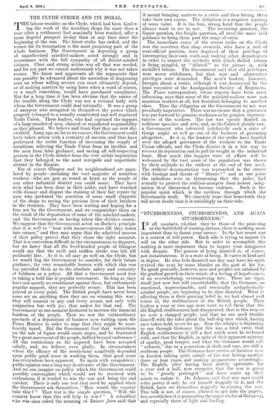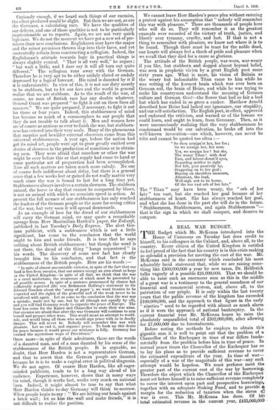"STUBBORNNESS, STUBBORNNESS, AND AGAIN STUBBORNNESS."
IN all combats, whether they be those of the prize-ring or the battlefield of warring nations, there is nothing more important than to daunt your enemy. In the last resort war is a contest of will-power. Each side is trying to impose its will on the other side. But in order to accomplish this nothing is more important than to inspire your antagonist with despair. The process of being daunted is, of course, not instantaneous. It is a state of being. It varies in kind and in degree. He who feels daunted one day may have his spirit revived the next by some blunder on the part of his foe. To speak generally, however, men and peoples are subdued by the gradual growth in their minds of a feeling of hopelessness, of an overwhelming, overmastering fate. There are signs, small just now but still unmistakable, that the Germans, an emotional, impressionable, and essentially metaphysically minded people, are beginning to be thus daunted. What is affecting them is their growing belief in, we had almost said terror 43f, the stubbornness of the British people. Their leaders a year or two ago were wont to tell them that the old English stubbornness had disappeared, that in this respect we were a changed people, and that no one need trouble himself with the tales about the bull-dog race which, having once taken hold, never let go. Now the whisper is beginning to run through Germany that this was a fatal error, that English stubbornness is still a fact which must be reckoned with, and that the English, in spite of their apparent mixture of apathy, good temper, and what the Germans would call "softness," due to a generation of sloth and ease, are still a stubborn people. The Germans hear stories of business men in London talking quite calmly of the war lasting another three or four years, and making preparations accordingly. The English, after having been unduly optimistic for a year and a half, now recognize that the war is going to be "greatly prolonged" and have made up their minds to endure it. Dr. Johnson said that any man could write poetry if only he set himself doggedly to it, and the British have set themselves doggedly to winning the war. This talk is not, of course, allowed to get into the papers, but nevertheless it is permeating the upper circles of Germany, and especially those of light and leading. Curiously enough, if we heard such things of our enemies, the effect produced would be slight. But then we are not, as are the Germans, a calculating race. We have the qualities of our defects, and one of those qualities is not to be particularly impressionable as to reports. Again, we are not very quick logicians. We do not the moment we have got a new set of pre- misses draw new conclusions. Englishmen may have the major and the minor premisses thrown slap into their faces, and yet contentedly refrain from constructing a syllogism. Indeed, the Englishman's attitude towards logic in practical things is always slightly cynical. "That is all very well," he argues ; "but wait a little, and I dare say it will all turn out quite different." The syllogism runs away with the German. Therefore he is very apt to be either unduly elated or unduly depressed by a logical forecast. His mind is daunted by it if it is unfavourable. In view of this, it is not our duty merely to be stubborn, but to let our foes and the world in general realize that we are stubborn. As to the result of the war, of course, no man of British race has any doubts whatever. General Grant was prepared "to fight it out on these lines all summer." We are quite prepared, if necessary, to fight it out for three or four years. Indeed, this stubbornness of mind has become so much of a commonplace to our people that they do not trouble to talk about it. Men and women here are of course as anxious as ever to finish the war, but stubborn- ness has entered into their very souls. Many of the phenomena that surprise and bewilder external observers come from this universal stubbornness. A year ago, before the nation had got its mind set, people were apt to grow greatly excited over stories of slowness in the production of munitions or in obtain- ins, men. They were afraid that somehow or other the war
9
might be over before this or that supply had come to hand or some particular act of preparation had been accomplished. Now all such matters are taken much more calmly. No one of course feels indifferent about delay, but there is a general sense that a few weeks lost or gained do not really matter very much since the war is bound to last for a long time yet. Stubbornness always involves a certain slowness. The stubborn animal, the horse or dog that cannot be conquered by blows, in not an animal with which we associate speed in action. At present the full menace of our stubbornness has only reached the leaders of the German people or the more far-seeing critics of the war, but very soon it will spread downwards.
As an example of how far the dread of our stubbornness will carry the German mind, we may quote a remarkable passage from Herr Maximilian Harden's paper, the Zukunit, published in last Tuesday's Daily Express. The alert Ger- man publicist, with a suddenness which is not a little significant, has come to the conclusion that the world ought to kiss and make friends. It is true that he says nothing about British stubbornness ; but though the word is not there, the dread of the thing "hangs sequestered" in his words. The discovery of some new fact has clearly brought him to his conclusion, and that fact is the stubbornness of the British people. Here are his words :— "In spite of almost uncountable victories, in spite of the fact that our land is free from enemies, that our armies occupy an area about as large as the United Kingdom—in spite of all that, we think that the war is a cruel misfortune, the recurrence of which must be prevented by all possible means. In spite of a sentence pronounced by chance but sufficiently regretted (Dr. von Bethmann Hollweg's statement to Sir Edward Goschen about the 'scrap of paper '), we want treaties to be respected and the rights of the powerful and of the weak never to be interfered with again. Let us come to the conclusion that the war was a mistake, made not by one, but by all (though not equally by all), and you will find Germany ready to organize the peace of Europe. The hour has come for the Kaiser and Chancellor to state their war aims. Our enemies are afraid that after the war Germany will continue to arm herself and prepare other wars. This would mean an attempt to world. rule, and would bring all those who would sign peace with us in deadly danger. This will never be. Nobody will remember this war with pleasure. Let us end it, and organize peace. To hush up this desire for peace because it would prove our weakness is folly. Germany has learned the mysterious ways of Providence."
Once more—in spite of their adroitness, those are the words of a daunted man, and of a man daunted by his sense of the stubbornness of the British people. It is arguable, no doubt, that Herr Harden is not a representative German, and that to assert that the German people are daunted because he is is to make a capital error in political diagnosis. We do not agree. Of course Herr Harden, like all eager- minded publicists, tends to be a long way ahead of his audience. Experience, however, shows that in many ways his mind, though it works fast, works very much on national lines. Indeed, it might almost be true to say that what Herr Harden thinks to-day Germany will think to-morrow. When people begin to say : "We are hitting our heads against a brick wall ; let us lass the wall and make friends," it is not difficult to realize the position. We cannot leave Herr Harden's peace plea without entering a protest against his assumption that " nobody will remember this war with pleasure." There are thousands of people here who will do so. They will remember it as the greatest example ever recorded of the victory of truth, justice, and liberty over tyranny, cruelty, and lust. If that is not a thing to remember with pleasure, we know not where it is to be found. Though there must be tears for the noble dead, our hearts will always feel a throb of pride and pleasure when we recall that they died for a cause so glorious.
The attitude of the British people, war-worn, war-weary if you like, but stubborn and dogged almost beyond belief, was seen in prophetic vision by a great English poet some sixty years ago. What is more, his vision of Britain as the weary but indomitable Titan came to him while he was writing of the keenest brain which was ever born on German soil, the brain of Heine, and while he was trying to make his countrymen understand the meaning of German culture and German Geist—the flower that had so fair a bud but which has ended in so gross a canker. Matthew Arnold described how Heine had lashed our ignorance, our stupidity., and our self-satisfaction. The English poet, in elect, approved and endorsed the criticism, and warned us of the lessons we could learn, and ought to learn, from Germany. Then, as it were unconsciously realizing that the very stubbornness he condemned would be our • salvation, he broke off into the well-known invocation—one which, however, can never be trite and cannot be quoted too often :— " So thou arraign'st her, her foe ; So we arraign her, her sons. Yes, we arraign her ! but she, The weary Titan ! with deaf Ears, and labour-dimm'd eyes, Regarding neither to right Nor left, goes passively by. Staggering on to her goal ; Bearing on shoulders immense, Atlantean, the load,
Well-nigh not to be borne, Of the too vast orb of her fate."
The " Titan " may have been weary, the "orb of her fate" too vast, but she reached her goal because of her stubbornness of heart. She has always reached her goal, and what she has done in the past she will do in the future. "Stubbornness, Stubbornness, and again Stubbornness "- that is the sign in which we shall conquer, and deserve to conquer.



































 Previous page
Previous page